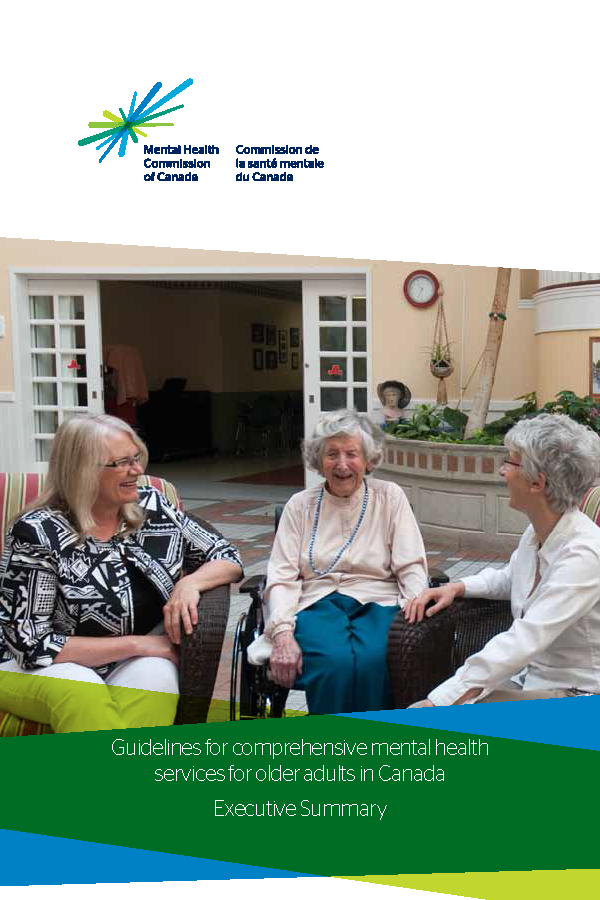If you are in distress, you can call or text 988 at any time. If it is an emergency, call 9-1-1 or go to your local emergency department.
Mental Health Commission of Canada Seniors Guidelines – Executive Summary
Background & Development of the Guidelines The Canadian population is aging, a process that is currently undergoing a rapid acceleration as the baby boom generation moves into older age, and is also influenced by increased life expectancy and decreased fertility (Carstairs & Keon, 2009). If left unaddressed, this trend will have far-reaching social, economic, and political impacts, including an increasing number of seniors who are at risk of experiencing mental health problems. These Guidelines present an opportunity to address concerns with the current health and mental health system from the perspective of older adults and provide recommendations for moving toward a transformed mental health system that supports older adults in their journey towards recovery and well-being. The development of these Guidelines was overseen by representatives from the Mental Health Commission’s Seniors Advisory Committee, Science Advisory Committee, and Mental Health Commission staff. Between June 2009 and January 2011 the project team engaged stakeholders (older adults with lived experience, caregivers, service providers, program planners, policy makers, and educators) from across the country to build an understanding of the changes required to create a comprehensive mental health system for older adults. In addition to the information gathered from stakeholders, a review of academic literature and government documents (international, national, and provincial) was completed. Based on this evidence, a model was developed to depict an integrated and comprehensive mental health service system for older adults. Guideline content The full document has been organized into three separate parts. Each section includes evidence-based recommendations highlighted in grey boxes. View the full Guidelines. Part I: Framing the Context – Key Factors to Consider in Planning a Comprehensive Integrated Mental Health System for Seniors Part I sets the context and explores the key factors that should be considered when planning a mental health service system for older adults. Of particular note are the guiding values and principles that underpin all of the recommendations and content of this document. Part I also include recommendations about the determinants of mental health, mental health promotion and prevention, and early identification of mental health problems. Part II: An Integrated Model for Mental Health Services in Late Life Part II focuses on the services required to support adults in later life. This includes the model for mental health services in later life and descriptions of the functions of each resource. Additionally, Part II offers staffing benchmarks for specialized seniors’ mental health services and a discussion on how to apply the benchmarks. Part III: Facilitators of a Comprehensive Mental Health Service System And finally, Part III discusses the mechanisms that facilitate a comprehensive mental health service system. This includes recommendations about cultural safety, diversity, the role of caregivers, and service delivery models. Summary of recommendations Detailed recommendations and supporting evidence are provided throughout the Guidelines. Below is a summary of key recommendations. Transformation of a mental health service system must include training, education and support for caregivers and health care providers to increase their capacity to respond to the mental health needs of seniors.
SHARE THIS PAGE
RELATED

Review our Assessment Framework for Mental Health Apps — a national framework containing key standards for safe, quality, and effective mental health apps in Canada.

To help expand the use of e-mental health services, we developed four online learning modules based on our Toolkit for E-Mental Health Implementation, in collaboration with the Centre for Addiction and Mental Health (CAMH).

Stepped Care 2.0© (SC2.0) is a transformative model for organizing and delivering evidence-informed mental health and substance use services.
